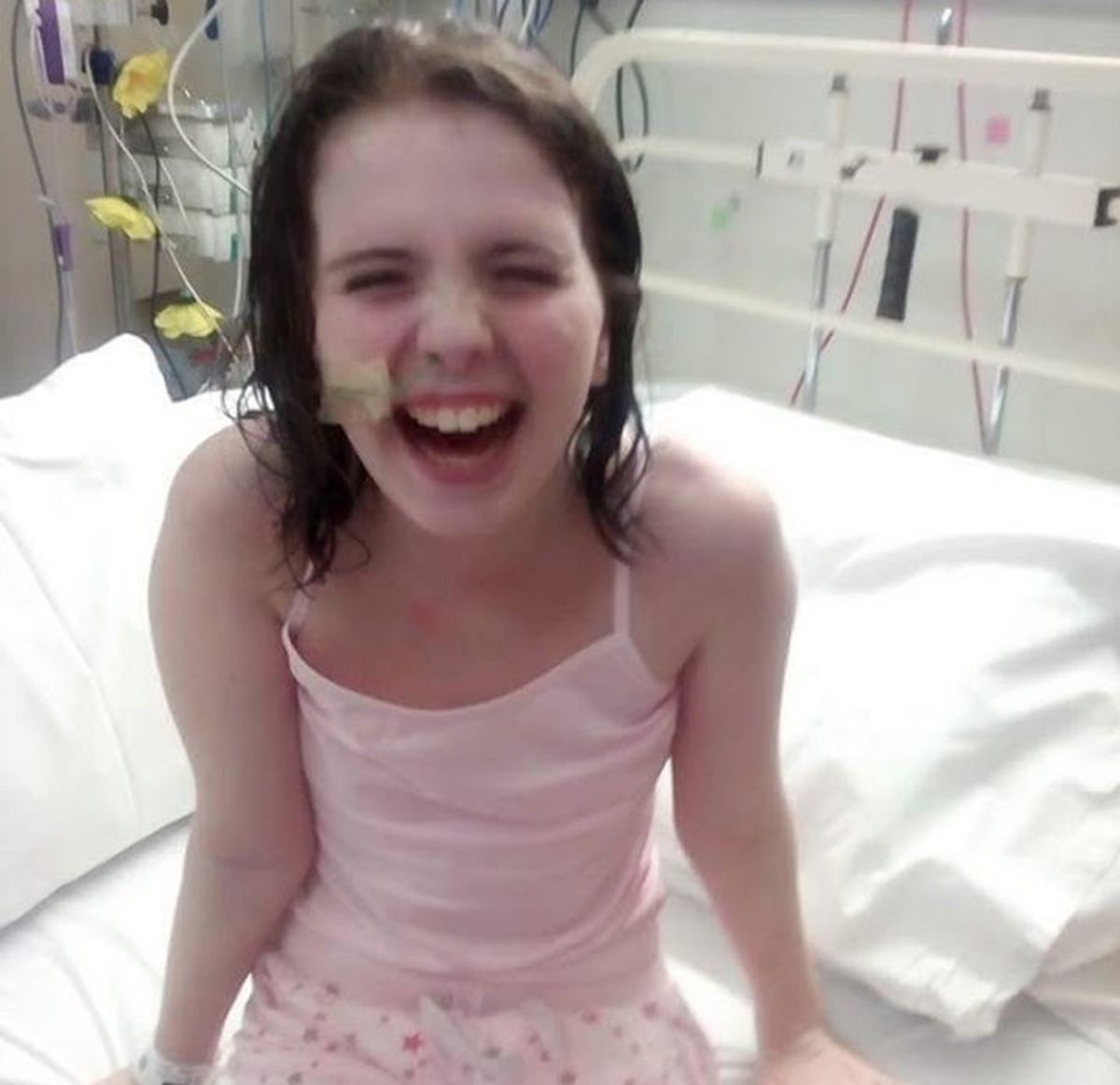A mum has revealed how a terrifying brain condition suddenly turned her “perfect" daughter into a foul-mouthed stranger who did not recognize her own family and was prone to violent mood swings.
When Aoife Hartnett, now 14, collapsed whilst bouncing on the trampoline with her friends one afternoon after school aged 11, they simply thought she was 'playing dead' – until she started foaming at the mouth.
Raced to hospital, the youngster was placed in an induced coma and diagnosed with Hashimoto Encephalopathy, a type of encephalitis, which is a rare condition that sees the immune system mistakenly attack the body's own cells.
After 22 days, she regained consciousness, but, a world away from the sociable, happy girl she had been, she would hallucinate and erupt in angry outbursts, even telling teachers to “f*** off".
Describing how Aoife, who has two brothers, Eoghan, 11, and Ronan, 10, still suffers with seizures but is improving day-by-day, her mum Louise Carolan, 49, from Dublin, Ireland, said:
“Aoife was bright and happy – she was a perfect little girl."
“But it was like her personality changed, and what I noticed most was that she lacked empathy."

She continued:
“Before, she would give money to homeless people on the street, but that had gone. If she hurt her brothers, it was like she didn't care."
“She became very aggressive physically. I got a few thumps, and I couldn't leave her alone with her brothers in case she became angry."
“She was confused and angry, and would get agitated by certain things, like the ticking of a clock. We're an empathetic family so I couldn't understand it and found it really hard to deal with."

In the build-up to Aoife's hospitalization in September 2016, Louise, who has separated from her children's father, who does not want to be named, explained how the schoolgirl had seemed more tired than usual on a family holiday to Fuengirola in Spain.
After returning, she also started complaining of an earache and upset tummy.
Then, around a week later, she was playing on a trampoline with her next-door neighbors when she collapsed.
Louise explained:
“My neighbor heard the kids saying, 'Aoife's playing dead'. He saw she was out for the count and foaming at the mouth."

“There was screaming at my front door, so I ran to her and saw that she was blue and had stopped breathing. It felt like she wasn't breathing for a good few minutes. I was hysterical."
Aoife was raced to Temple Street Children's University Hospital in Dublin with her father, while Louise followed behind, where she was connected to a breathing machine due to the severity of the seizures she'd started having when she arrived at the hospital.
Louise and her husband were kept in a separate room while Aoife was taken to the resuscitation room in A&E. There were around 10 doctors in there trying to stop her seizures.
Louise continued:
“She'd never had a seizure in her life and they are an incredibly frightening thing to witness. She would shake uncontrollably and her pupils would focus on one spot and not move. She would be out for the count."
“Doctors were tracking her brain activity using an electroencephalogram (EEG) which picks up electrical signals and it had registered continual seizures at this point."
“After two hours, I was allowed in to see her in the resuscitation room."

Louise recalled:
“I just collapsed onto the floor. There were machines everywhere. She was just lying there and, in my eyes, it was like she was just cold. It was absolutely horrific."
“She was on a breathing machine, and every time doctors tried to bring her off it, she would have a seizure."
At first, doctors were baffled as to what was causing Aoife's symptoms, frantically checking to see if she'd had all her vaccinations, and even phoning Spanish authorities to ask if there had been a virus outbreak over there in case she had picked something up on holiday.

Then, a series of MRI scans and a lumbar puncture – which takes a sample of fluid from the spine – found she had some swelling on the brain.
To give her body a chance to recover, she was placed into an induced coma, and was officially diagnosed with Hashimoto Encephalopathy whilst unconscious.
According to the charity The Encephalitis Society, it can affect all age groups, but is most common in females of around 50.

Thought to be an autoimmune condition, the exact cause is unknown, and symptoms include drowsiness, psychiatric disturbances and jerky movements, some of which may be seizures.
Medics treated Aoife with a course of steroids and a blood plasma exchange – where plasma is removed from the blood and replaced – before bringing her round after 22 days.
Coming to, she was unable to walk, talk, or even recognize her family.
Louise said:
“She would look at us, but she was vacant. There was a deadness in her eyes."
Louise continued:
“She started to hallucinate and would talk to the machines in the ward. She even told us she could see her grandad, who had died four years before she was born."
“I would try and console her, but then sometimes she would look at me like, 'Who are you?' It was five or six days before she recognized us."
“We were told she would have to relearn everything, including how to sit up on her own. She was having to wear nappies and be fed via a tube."

Slowly, Louise began to see glimmers of determination from Aoife, who retaught herself to sit up, and walk to the bathroom.
She managed to recall the lyrics to Ed Sheeran's "Thinking Out Loud," which was one of her favorite songs, and sang it to her parents.
Having found being fed via a tube highly distressing, another big step was, six weeks after she was admitted, being able to eat again – first it was mashed potato, mashed carrots and yoghurt then small pieces of chicken. She was also able to take her own medicine, which at that point was 50 pills a day.
Finally, after 12 weeks, Aoife, who also had physiotherapy to help her grow stronger, was allowed home.
But sadly, her nightmare was far from over, as it became clear that despite having medication she was still suffering two to three seizures a week, as well as dealing with personality changes.
Louise said:
“I couldn't leave her on her own for even a couple of minutes in case she had a seizure."

“She was getting regular visits from an occupational therapist, who would ask her to carry out simple tasks like making a cup of tea or a sandwich."
Louise said:
“You could see that she was having to really think about it and would get muddled or forget halfway through what she was meant to be doing."
In January, Aoife, then on a high dose of steroids and anti-seizure medication, was able to return to school, where she was in her final year of primary school, gradually increasing her hours with a teaching assistant with her at all times.

Explaining how different her daughter's behavior now was, Louise continued:
“She would randomly scream out loud in the classroom, or tell the teachers to f*** off. She'd call teachers fat and ugly."
“Whatever came into her head would come out of her mouth – she just had no filter."
“Before she got ill it was really unusual to hear her swear and she would immediately cover her mouth if she said something and would feel really bad about it."

She recalled:
“We would be in public places, like on the bus, and she would shout at me to f*** off. I would feel like everybody was judging us."
“I would find myself in the position of trying to act normally, but also wanting to shout to the world, 'You haven't got a clue. Don't you realize what this child has been through?'"
“There were times when I'd come home, get into the shower so no-one could see or hear me and just cry my eyes out."
Consulting a psychiatrist, Louise was told that Aoife would need to rebuild all the learnt behaviors she had picked up as a child, such as feeling empathy and social etiquette, knowing what is appropriate to say in public.
Louise added:
“It was like she had no understanding of how to behave in the world. It's so much better now, but there's still a little struggle and she still has issues with her memory."
Now, despite still struggling with school, finding spelling and maths hard, and getting exhausted if she has to concentrate for more than 20 minutes, she is slowly making progress – although, since April 2018, she has been suffering with a different type of seizure brought on by anxiety.

These happen once or twice a day where she will shake uncontrollably but be conscious and aware of what's happening, and is usually able to get them under control herself.
She still takes 22 tablets a day to try and keep her seizures under control and these have now reduced to once or twice a month.
Louise added:
“All of that is slowly getting better. We hope it will continue to do so."

Explaining how tough it was going back to school, the brave teenager said:
“At first, I was totally oblivious to having no filter. I had a friend at school who I called fat – but I had no idea I'd done it."
“My first year in secondary school was a terrible time to make friends. People would say I was faking seizures or ask me if I was the girl with the brain that didn't work and laugh at me."
“I started to get flashbacks to my time in hospital. I could remember not being able to speak. It was very scary."

Aoife continued:
“I'm nervous about the future but I know I've come so far. I'm teaching myself how to study again and I've joined a theatre group. I'd love to grow up and be a journalist, an actress or a detective."
Louise added:
“I feel like the world is her oyster. I say to her things happen for a reason. I'm still waiting to find out why this happened, but I think sometimes your life takes a turn and it's how you deal with that."
“My daughter is the most amazing person. Her strength and resilience to wake up every morning, face a world that can be quite cruel and keep pushing ahead is astounding."
For more information on encephalitis visit www.encephalitis.info.
 COMICSANDS
COMICSANDS percolately
percolately georgetakei
georgetakei secondnexus
secondnexus george's picks
george's picks












